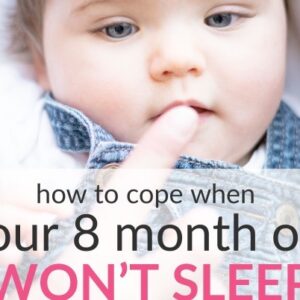With all the sleep training methods available, promising that your baby will sleep through the night within days in his or her crib, nursing baby to sleep may seem like a failure, extremely lazy and all wrong. Who wants to be a human pacifier…
In my view, letting a baby fall asleep at the breast is simply natural! All cuddled up in mom’s warm, safe arms, suckling and slowly getting full – no wonder the baby relaxes enough to fall asleep.
But of course, there may come a day or a life situation when this simply doesn’t work anymore. If that day has come, you will find suggestions on how to stop nursing your baby to sleep here.
Below we’ll talk about the pros and cons of nursing baby to sleep depending on age.
Pros and Cons of Nursing Baby To Sleep Depending On Age
Nursing A Young Baby To Sleep
With a newborn baby and during their first few months of living, it is almost impossible to prevent the infant from falling asleep at the breast. Actually, it is even common that the baby falls asleep too quickly, so the mom has to wake up the baby a little bit to get him or her to eat enough.
The first time I was a new mom, I read and wanted to try the E.A.S.Y. method. If you haven’t heard of it, it means Eat, Activity, Sleep, You time. The point is to have the baby first eating, then playing, then sleeping and thereby, mom will find You time – time for herself. Sounds great, doesn’t it!? Only it doesn’t work! At least it didn’t work for me.
Young babies fall asleep at the breast while eating. And when they wake up, they tend to be hungry too. This is completely natural since they grow at the speed of light and have really tiny tummies.
Trying to force a young baby into just about any schedule, will give you grey hairs and a sad baby.
So if your baby is younger than some 4-5 months and falls asleep at the breast, don’t worry about it.
So again, don’t feel bad if you are nursing baby to sleep – or even just for comfort!
What you can do, once the baby is older than 2 months and maybe is starting to sleep on a more regular schedule, is to feed your baby slightly earlier, while still not very sleepy, and then try to put him or her down in the stroller or crib. At around this age, surprisingly many babies actually accept this. If you rock the stroller or put a musical mobile over the crib, your baby may very well fall asleep there instead of at your breast.
I find this a great combination – let your baby fall asleep at the breast if he or she does, but combine it with trying to gently introduce the crib or stroller or both. Once your baby reaches 4 months, it may become more difficult to leave your baby awake in the crib. The baby is getting more aware of his surrounding, and some get their first booths of separation anxiety.
There are also ways to gently teach your young baby to not use you as a human pacifier, and you can read about that among the tips below.
You should also be aware that nursing for comfort (i.e., not for hunger) is good for babies too. They bond with their mom, cry less, and learn to feel safe outside the womb. Several studies of indigenous people, where the infants are carried around all the time and are allowed to breastfeed completely on-demand, show babies that cry a lot less than babies in developed countries. Also colic is almost unheard of.
So again, don’t feel bad if you are nursing your baby to sleep – or even just for comfort! Even though it may take longer for the baby to sleep through the night this way, as many experts are quick to point out, as long as it works for you, it is completely fine!
Also, remember that breastfeeding – whether it is during the day or night – is something you learn. It takes time both for the mom and baby to make it work smoothly, so trying at the same time to avoid nursing your little one to sleep is just too much!
Nursing An Older Baby To Sleep
Older babies often also prefer to fall asleep at the breast and in your arms. The older the baby or toddler, the more often this is true nursing for comfort since hunger is likely to be less of an issue. Easy to understand, but for many, not quite as easy to cope with in the long run for many reasons. First of all, you probably start suspecting that your baby’s wish to nurse has nothing to do with hunger anymore. And thereby your patience with having to nurse your baby for every nap and every time he wakes up at night will start to diminish.
“Will this baby NEVER sleep go to sleep without breastfeeding? What am I doing wrong?”
In addition, you are probably getting seriously exhausted. Month after month, without proper sleep, can drive anyone insane.
When you feel like this, remember two things:
- First of all, there are ways to get decent sleep even if you feed at night. (Read our collection of sleep tips for exhausted moms here.)
- Secondly, you may or may not be correct in your assumption that your baby isn’t hungry, just using you as a human pacifier. Or you are right half of the time. It is a tricky situation. And even if your baby isn’t hungry, nursing is a lot about comfort too, especially when the baby starts to reach the sensitive age of 7-10 months, when many babies are terrified of being left alone.
So even if your baby is 10 months old or older and prefers to fall asleep at the breast, there is nothing wrong with it. If it works for you, everything is fine no matter if everyone and his uncle have babies that sleep through the night! (You can read about the benefits of extended breastfeeding here.)
How To Stop Nursing Baby To Sleep
If you have read all above about the explanations as to why your baby may be nursing to sleep and why it may be good reasons to let it continue, then definitely go ahead and start teaching your baby to fall asleep without your breast. In this article, we provide some useful tips on how to stop nursing baby to sleep and explain which method works the best for different ages.
Good luck! Feel free to share your thoughts and opinions about this by leaving a comment below. :-)

Paula Dennholt founded Easy Baby Life in 2006 and has been a passionate parenting and pregnancy writer since then. Her parenting approach and writing are based on studies in cognitive-behavioral models and therapy for children and her experience as a mother and stepmother. Life as a parent has convinced her of how crucial it is to put relationships before rules. She strongly believes in positive parenting and a science-based approach.
Paula cooperates with a team of pediatricians who assist in reviewing and writing articles.







